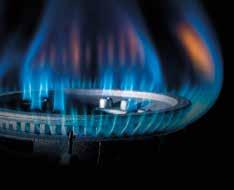
2 minute read
Construction is booming north of Durban
Oil and gas
Italian company Eni has offshore prospecting rights.
Eni, one of the world’s biggest energy companies, has an agreement with Sasol Petroleum International to explore for hydrocarbons off the coast of KwaZulu-Natal. The permit was granted in 2013 but moves to start operations in 2018 attracted the attention of concerned environmentalists. Eni, which has headquarters in Rome and operates in 71 countries, has several projects off the coasts of Mozambique and Kenya.
The regulator and promoter of oil and gas exploration in South Africa, Petroleum Agency South Africa, has awarded coalbedmethane-gas exploration rights in KwaZulu-Natal to NT Energy Africa, which has a partnership with the Central Energy Fund. These awards are for onshore exploration. The Petroleum Agency SA is an agency of the National Department of Energy.
If a private partner can be found, a liquid natural gas (LNG) plant will produce 2 000MW on a site in Richards Bay. This forms part of national government's allocation of 3 126MW to natural gas in its medium-term energy policy to 2030.
The National Department of Energy (DoE) decided in 2016 that one of the first two gas-to-power plants to be constructed under the Independent Power Producer Procurement Programme would be allocated to Richards Bay. This has the potential to turn the Richards Bay Industrial Development Zone (RBIDZ) into an energy hub. The fact that neighbouring Mozambique has significant offshore deposits is a factor in this ambition. To produce its allocation of 2 000MW, the plant would have to use a million tons a year of liquid natural gas (LNG).
ONLINE RESOURCES
National Energy Regulator of South Africa: www.nersa.org.za Petroleum Agency SA: www.petroleumagencysa.com South African National Energy Association: www.sanea.org.za South African Petroleum Industry Association: www.sapia.co.za
SECTOR INSIGHT
A liquid natural gas plant is planned for Richards Bay.
A new unit within the National Department of Trade and Industry (dti) is focussed on importing LNG, particularly from Mozambique and Botswana. Local demand for LNG is expected to increase to more than 10-million tons per annum.
Getting fuel to the province of Gauteng is the key mission of the new multi-purpose pipeline (NMPP) which started delivering fluids in 2012. Refined products such as jet fuel, sulphur diesel and both kinds of octane petrol are carried. The infrastructure of Transnet Pipelines is said to reduce the number of fuel tankers on South African roads by about 60%.
KwaZulu-Natal is home to two major oil refineries and is the first link in the pipeline chain that links Gauteng province, the industrial heartland of South Africa, with vital fuels. The Port of Durban handles 80% of South Africa's fuel imports. KwaZulu-Natal is thus a key player in the country’s oil and gas industry.















